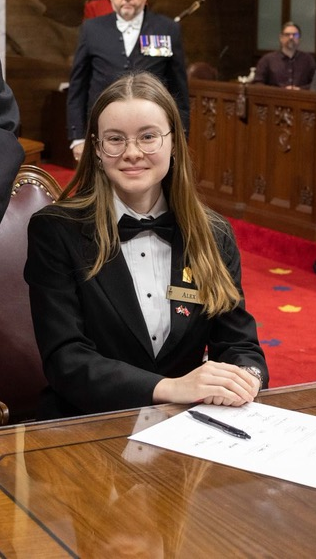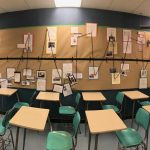
Risa Gluskin interviewed Alexandra Morton, a university student in Ottawa and Page in the Senate of Canada. Her experiences and insights could be valuable for Civics and History teachers alike. For more information on the Senate Page program please visit the Senate webpage.
Alexandra Morton at her Senate Page Swearing In Ceremony (courtesy of Alexandra Morton).
What are you studying at university in Ottawa? And is that where you learned about the Senate Page Program? How so?
I am currently pursuing a Bachelor’s of Global and International Studies (BGInS) at Carleton University. The program is unique and perhaps even unorthodox – the study of international relations is approached through principles of multi-disciplinary and experiential learning. When contrasted with other international relations programs today, whose required courses are usually limited to economics, international theory, and political science, BGInS tacks on second language requirements, history, literature, international law, ethics, ethnography, and more.
Carleton does promote both the Senate and House of Commons Page Programs to current students; however, I first heard of the job back in Grade 12. During one of the university fairs my high school hosted, the programs were mentioned in passing as a possible student job opportunity by one of the Carleton representatives. At the time I seriously considered applying, but I hadn’t yet settled on Carleton and decided to wait. Two years later, halfway through my second year at university, I finally applied and was successful.
Please highlight some of the interesting duties of a Senate Page.
As a Senate page I am responsible for providing a range of services to ensure the effective operation of the Senate and its committees. Before sittings in the Chamber, Pages make sure it is set up appropriately, visitors are situated in the galleries, bells are rung, and we undertake a variety of other necessary clerical tasks. During the sittings, I am present on the Chamber floor to facilitate document distributions, standing votes, moments of silence, and more. I additionally provide the Senators with any other support they need during sittings. During committee meetings, Senators have the opportunity to hear from and question witnesses on a specific topic related to the committee’s mandate (often pertaining to a bill or study they have been assigned). I operate in a similar function to my role in sittings when in committee. I am additionally responsible for onboarding virtual witnesses and welcoming those that appear in-person. The opportunity to network with witnesses is one of my favourite parts of my role – I’ve had the chance to spend time with ambassadors, ministers, MPs, CEOs, and more.
Like most jobs, occasionally the day-to-day can get a little monotonous; however, special events are an opportunity to experience new things. In my two years as a Page, I have worked three Presidential Joint Addresses: President Biden’s, President Zelenskyy’s, and President von den Leyen’s. It was such an honour to be a part of each. I additionally have participated in State funerals (including Queen Elizabeth II’s), Royal Assent ceremonies, the Installation of a new speaker of the House of Commons, Swearing-in ceremonies, and more. I cannot emphasize enough how formative my participation in each has been; not to mention the incredible opportunity to make connections with the esteemed guests who have attended these events.
For the benefit of Ontario Civics and History teachers, let us know how seeing the Senate at work has given you a sense of democracy in action?
As a Page, I literally see democracy in action every day. I observe Senators in the Chamber introducing, deliberating, debating, amending, and voting on legislation. It is in committee, however, that I believe the Senate does its most important work. In essence, Senators hear evidence from witnesses and review bills section by section. Senate committees additionally study issues of public concern apart from bills, such as mental health, Islamophobia, Indigenous rights, and more. As the Senators in each committee have specialized knowledge and experience on the topic, the legislation and any subsequent amendments are considered by those who actually have real-life experience in the field. For example, most of the Senators on the Standing Committee for Foreign Affairs and International Trade have an extensive background in international diplomacy.
Having now spent two years working in the Senate, I have gained a great deal of respect for the institution as a whole. In an era where hyper-partisanship has become the norm, the Senate has done a good job of striking a balance. Given its more independent and non-partisan nature, debates are often much more reasonable and grounded in fact instead of rhetoric. That’s not to say that ideology plays no part, but it is simply not as extreme or (in my opinion) as toxic as it can get in the House. I have also realized that the vast majority of Senators are there for more than just a paycheque, opposite to how they are often portrayed. They appear to genuinely care about the work they do and strive to do their best to represent the interests of their regions every day. While I can admit that I might be a little biased, I do believe that many Canadians fundamentally misconstrue and misunderstand the Senate today.
You told me the Page Program really emphasizes non-partisanship. Please elaborate.
As a Senate Page, I am expected to be always non-partisan. This means that I am to be free from political affiliation, bias, or designation in my work on the Parliamentary Precinct, on social media, and in any other publicly visible occasion. This is primarily to ensure all Senators receive equal treatment; however, it is also a reflection of the Senate’s transition into a more non-partisan chamber of second thought.
How has the emphasis on non-partisanship influenced you?
To put it simply, the emphasis on non-partisanship has made me much more self-aware. Having to police my language and responses to opinions I might not agree with has forced me to confront my own political biases and think more for myself. I have now made it a habit to seek a variety of differently positioned opinions on a topic before I make any sort of judgement – something I certainly wouldn’t have done before. This has additionally helped improve my ability to decipher arguments based in rhetoric from arguments grounded in fact. I also better understand the importance of non-partisanship generally – it ensures that decisions are based on merit and not influenced by personal biases or political affiliations. This is all the more important to consider when working in politics or the civil service.
How has being a Senate Page helped you in your studies?
My role has helped me in my studies in a variety of ways. Primarily, it has forced me to develop excellent time management and organizational skills. As hours in the Senate fluctuate according to the Parliamentary calendar, I sometimes find myself working 40 plus hours a week, on top of a full-time university schedule. Sitting lengths are also unpredictable and sometimes end past midnight. I now make very good use of calendars and agendas to ensure I can complete all my schoolwork on time. My work in the Senate has also inspired many of my essays. For example, after having heard the topic discussed in committee, I used testimony from the Committee on Legal and Constitutional Affairs to support arguments in my writing.
Please let our readers (Ontario teachers) know if and how your choice of future job/education pathway has been influenced by your work as a Senate Page?
Before I started as a Senate Page, I would have told you that my next stop after completion of my undergraduate degree was, without a doubt, law school. While I am still considering a future in law, my time in the Senate has inspired much more global aspirations. I now hope to work internationally for at least a few years after I graduate, before returning to Canada to complete either a Juris Doctor or a Masters. I attribute these new aspirations to the confidence I have gained in myself from my work, as well as the impressive people I have met (all of whom have endorsed working abroad as massively formative). I am also now considering a future in policy work. Being exposed to so much legislation, watching bills from their first introduction to Royal Assent, and observing the intricacies of Parliament has inspired my interest.
How do your peers react to your Senate page job?
To be quite honest, most of my peers assume I work at the Senate Tavern (a local bar) when I first bring it up. Unless the person I am speaking to is in Political Science, my experience has been that most really have no conception of the Senate’s function. I think this speaks to a general, society-wide ignorance of what Canada’s bicameral system truly entails.
If you could write the section of the grade ten Civics curriculum pertaining to the Senate, what would you emphasize the most?
I would emphasize the fact that the Senate is an appointed, independent body. Senators are traditionally appointed by the Governor General on the advice of the Prime Minister; however, since 2015 an independent advisory board has been responsible for all selections. The process is therefore much less politically driven than it was in the past. Once appointed, Senators serve indeterminately until age 75. This means that they do not have a 4-year limit on their time in office and it allows for more in-depth studies into issues of import to the country. Senators are also not beholden to the public in the same way that MPs are, providing a check and balance on the politically driven House of Commons. Political caucuses have additionally been almost entirely removed from the Senate. The Conservative Caucus is now the only partisan group left. New groups include: the Independent Senators Group, the Canadian Senators Group, and the Progressive Senators Group. As a Chamber of sober second thought, independence is crucial and allows the Senate to provide an unbiased assessment of legislation.
Risa Gluskin is a high school history and student success teacher in Toronto. As she is the former editor of Rapport, she has returned to her “Doing History” series while on leave this year. Please visit her blog, gluskin.ca, for her series “For Teachers of World History.”


